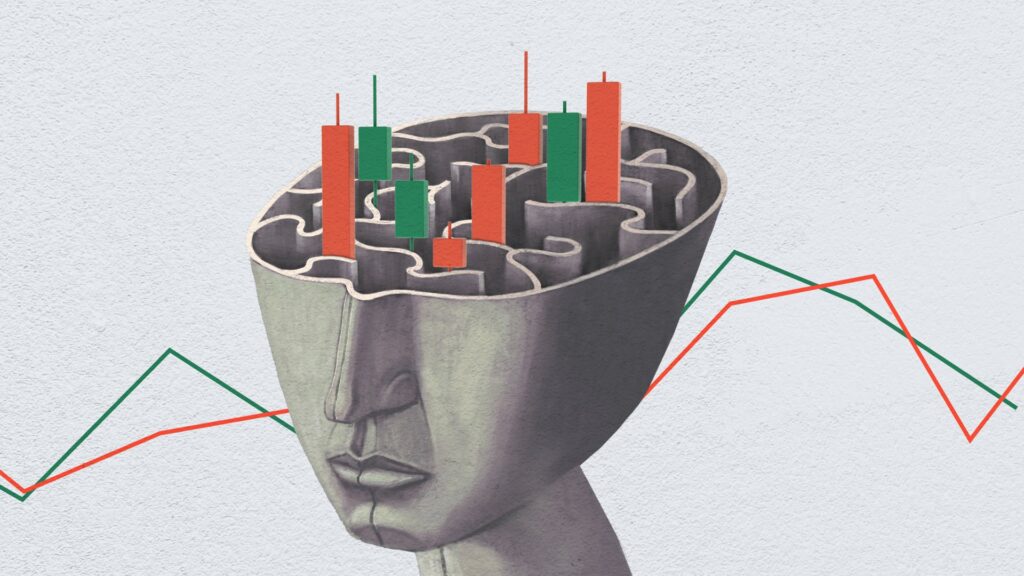Psychology of Trading: The Smart Mindset Shift That Leads to Long-Term Success – The Novice Trader’s Playbook

Ever Hit “Buy” Out of FOMO — Then Regretted It Immediately?
I’ve been there. One of my first trades was a rushed buy during a Bitcoin spike because everyone on Reddit was hyped. I had no plan, no stop-loss, and no clue. A few hours later, I was down 30%—and panicking. Sound familiar?
What I learned (the hard way) was this: the psychology of trading is just as important as technical analysis. Your emotions—fear, greed, FOMO, doubt—can wipe out your gains faster than a bad market.
In this guide, we’ll break down how emotions affect your trading success, and how to manage them like a pro—with practical tips, stories, and a steady dose of encouragement. Oh, and yes—we’ll tie it all back to the ultimate foundation: risk management.
Why Trading Psychology Matters More Than Most Think
Most new traders obsess over strategies, indicators, and “winning setups.” But even the best plan falls apart if you let emotions take the wheel.
Here’s what emotion-driven trading often looks like:
- Buying high out of greed or FOMO
- Holding losers too long out of hope
- Exiting winners too early out of fear
- Overtrading to “make back” a loss (a.k.a. revenge trading)
If this sounds like your last few trades, don’t beat yourself up. This is normal—but it’s also fixable.
The Three Big Emotions That Sabotage Trades (and How to Handle Them)
1. Fear: The Silent Account Killer
Fear shows up when:
- You hesitate to take a valid setup
- You cut winners short, worried the market will turn
- You avoid trading altogether after a loss
How to counter it:
- Use smaller position sizes to lower emotional pressure.
- Set stop-losses before you enter the trade. This is key to smart risk management.
- Accept that losing trades are part of the game.
“I started winning more trades when I stopped trying to win every trade.”
2. Greed: The Fast Track to Blowing Up
Greed whispers things like:
- “This one’s going to the moon—go all in.”
- “Don’t take profit yet—it might go higher.”
- “Double down. You can’t lose twice in a row.”
How to control it:
- Stick to your pre-set profit targets and position sizing rules.
- Remember: every trade is just one of many. Don’t treat it like the lottery.
- Journal your trades and review when greed got the best of you.
3. Frustration & Revenge Trading
These emotions come up when:
- You take back-to-back losses
- You feel like the market “owes you”
- You start placing trades just to feel something (yep, it happens)
How to break the cycle:
- Take a break. Even a day or two can reset your mindset.
- Reflect on what went wrong—was it your setup, or your emotion?
- Lean on your risk management system to prevent heavy losses during these streaks.
The Role of Risk Management in Controlling Emotions
If there’s one tool that helps you master your emotions, it’s a solid risk management plan. Why? Because it gives you structure. And structure beats stress.
A Good Risk Management System Should Include:
- Max risk per trade: 1–2% of your account.
- Predefined stop-loss and take-profit levels
- A daily or weekly loss limit: Walk away if you hit it.
- Position sizing rules: Based on account size, not “gut feeling”
When you know exactly how much you’re risking, even a loss feels manageable—not catastrophic. That reduces fear, greed, and panic.
“Once I stopped risking more than 2% per trade, my trading psychology improved overnight. I could think clearly, even after losses.”
Action Steps: Train Your Trading Mind Like a Pro
Here’s how to start rewiring your mindset for trading success:
Daily Trading Psychology Habits:
- Pre-market checklist: Are you trading your plan or your emotions today?
- Mindful journaling: Track not just what you did, but how you felt.
- Visualization: Picture sticking to your strategy—even when tempted.
- Walk breaks: After a win or a loss, clear your mind before the next trade.
- Positive self-talk: Replace “I always mess up” with “I’m learning to manage risk better.”
Bonus Tip: Use Your Journal to Spot Emotional Patterns
- Are your worst trades after a big win? (Overconfidence)
- Do you enter bad setups after losses? (Revenge trading)
Once you see the patterns, you can fix them.
Chart Example: Emotion vs. Strategy
(Note to designer: insert side-by-side chart illustration—one showing an emotional trade with no stop-loss and one showing a planned trade with clear entries/exits and risk management in place.)
Final Thoughts: Your Mindset Is Your Edge
Technical skills matter. Strategy matters. But if your emotions are running the show, none of it sticks.
The good news? You can train your trading mindset—just like you train your chart-reading skills. And the more you prioritize discipline, self-awareness, and smart risk management, the more confident and consistent you’ll become.
✅ Mastering your mindset is a skill.
✅ Risk management is your anchor.
✅ Emotional control is what separates gamblers from traders.
Keep the momentum going with our next guide:
📘 Ready to take your skills further? Don’t miss our next guide: Trading Signals: How to Read and Act on Them. Let’s continue on the path to becoming a savvy, informed trader.